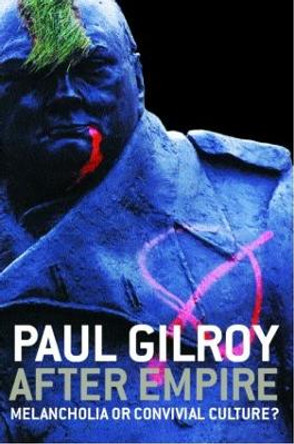Description
Paul Gilroy seeks to awaken a new understanding of W. E. B. Du Bois's intellectual and political legacy. At a time of economic crisis, environmental degradation, ongoing warfare, and heated debate over human rights, how should we reassess the changing place of black culture?
Gilroy considers the ways that consumerism has diverted African Americans' political and social aspirations. Luxury goods and branded items, especially the automobile-rich in symbolic value and the promise of individual freedom-have restratified society, weakened citizenship, and diminished the collective spirit. Jazz, blues, soul, reggae, and hip hop are now seen as generically American, yet artists like Jimi Hendrix, Chuck Berry, and Bob Marley, who questioned the allure of mobility and speed, are not understood by people who have drained their music of its moral power.
Gilroy explores the way in which objects and technologies can become dynamic social forces, ensuring black culture's global reach while undermining the drive for equality and justice. Drawing on the work of a number of thinkers, including Michel Foucault, Hannah Arendt, Primo Levi, and Frantz Fanon, he examines the ethical dimensions of living in a society that celebrates the object. What are the implications for our notions of freedom?
With his brilliant, provocative analysis and astonishing range of reference, Gilroy revitalizes the study of African American culture. He traces the shifting character of black intellectual and social movements, and shows how we can construct an account of moral progress that reflects today's complex realities.
Paul Gilroy's most important gift to cultural criticism is the deft manner in which he finds novel ways to explicate his great concern: the interweaving of ethics and aesthetics, through the example of the African American tradition. In Darker than Blue, Gilroy brilliantly examines some basic tensions within African American culture--in particular the changing relation, over the past half-century especially, between expressions of group consciousness and atomistic individualism. Gilroy is delightfully curious and rigorously analytical, making this book a pleasure to read and to argue with. It reaffirms his position as one of the leading cultural critics of our time. -- Henry Louis Gates Jr., Alphonse Fletcher University Professor, Harvard University No one writes about black music with more warmth and authority, urgency and conscience, than Paul Gilroy. With sentences jagged as bumpers, Darker than Blue focuses Gilroy's planetary attention on consumption and mobility in ways that open afresh the cases of Bob Marley and Jimi Hendrix, Robert Johnson and Charlie Christian. Suddenly they seem brand-new destination points on Gilroy's ethical compass. -- W. T. Lhamon Jr., Author of Deliberate Speed and Raising Cain
About the Author
Paul Gilroy holds the Anthony Giddens Professorship in Social Theory at the London School of Economics.
Reviews
Paul Gilroy's most important gift to cultural criticism is the deft manner in which he finds novel ways to explicate his great concern: the interweaving of ethics and aesthetics, through the example of the African American tradition. In Darker than Blue, Gilroy brilliantly examines some basic tensions within African American culture-in particular the changing relation, over the past half-century especially, between expressions of group consciousness and atomistic individualism. Gilroy is delightfully curious and rigorously analytical, making this book a pleasure to read and to argue with. It reaffirms his position as one of the leading cultural critics of our time. -- Henry Louis Gates Jr., Alphonse Fletcher University Professor, Harvard University
No one writes about black music with more warmth and authority, urgency and conscience, than Paul Gilroy. With sentences jagged as bumpers, Darker than Blue focuses Gilroy's planetary attention on consumption and mobility in ways that open afresh the cases of Bob Marley and Jimi Hendrix, Robert Johnson and Charlie Christian. Suddenly they seem brand-new destination points on Gilroy's ethical compass. -- W. T. Lhamon Jr., Author of Deliberate Speed and Raising Cain
Gilroy offers a shrewd and invigorating discussion--originally delivered as the W. E. B. Du Bois lectures at Harvard University--poised on the fraught intersections of race, class, and status present in the overlapping histories of African-American popular culture, the automobile as American capitalism's "ur-commodity," and the race-coded global reach of American style. Paying special attention to musical vernacular--from Robert Johnson to 50 Cent--Gilroy's stimulating reappraisal of the seductions of car culture underscores how status improvement for minorities has shifted from acquiring rights to acquiring objects. At the same time, he argues for the anticonsumerist notes struck by such "responsible troubadours" as Marvin Gaye and Bob Marley. Gilroy demonstrates how understanding black experience is crucial in any serious study of modernity itself, at a time when global capitalism trades evermore in American-inflected styles of "blackness," while simultaneously maintaining and reinforcing lines of racial and class subjugation...[A] highly rewarding read for anyone interested in the social and political significance of mass culture or the historically laden language of human rights in a postcolonial age. * Publishers Weekly *
Provocative...Insightful...Raise[s] profound questions about race, democracy, and citizenship in the age of Obama. -- Peniel E. Joseph * Bookforum *
If the moral force of Baldwin's writing was fuelled by the solidarity of the Civil Rights movement, Gilroy's book is a warning of moral bankruptcy creeping into contemporary U.S. black culture. According to Gilroy, commodities have replaced community, and the spirit of the freedom marches has been overtaken by the roar of accessorized Hummers. This is not simply a curmudgeonly critique of contemporary culture, and Gilroy teases out the reasons why the moral energy that galvanized the Civil Rights movement has been diluted by corporate American life in three penetrating and exhilarating chapters. -- Douglas Field * Times Literary Supplement *
Awards
Nominated for James A. Rawley Prize 2010 and Lora Romero First Book Publication Prize 2010 and John Hope Franklin Publication Prize 2010.
Book Information
ISBN 9780674060234
Author Paul Gilroy
Format Paperback
Page Count 224
Imprint The Belknap Press
Publisher Harvard University Press






